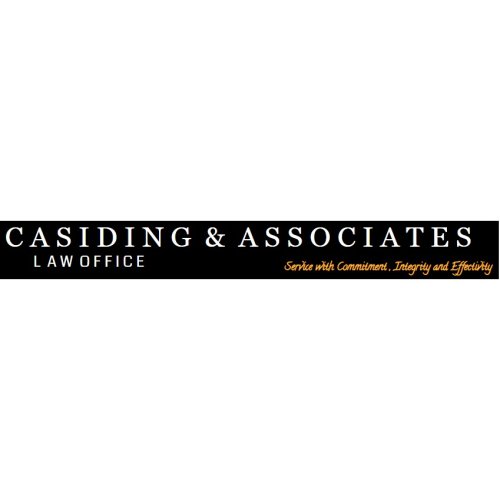Best Tax Increment Financing Lawyers in Philippines
Share your needs with us, get contacted by law firms.
Free. Takes 2 min.
Or refine your search by selecting a city:
List of the best lawyers in Philippines
About Tax Increment Financing Law in Philippines
Tax Increment Financing (TIF) is a public financing method used as a subsidy for redevelopment, infrastructure, and other community-improvement projects. By capturing the future tax benefits of real estate improvements, TIF aims to stimulate private investment in disadvantaged areas. In the Philippines, TIF is a relatively new method, often utilized in urban development to encourage investments in infrastructure and public spaces. The approach helps local governments overcome financial constraints and engage in significant development projects by leveraging anticipated future increases in property taxes.
Why You May Need a Lawyer
Seeking legal advice in Tax Increment Financing is essential for several reasons:
- Complexity of Agreements: The agreements and contracts involved in TIF projects can be complex and require meticulous review to ensure compliance with legal frameworks.
- Negotiation: Lawyers skilled in negotiations can effectively represent interests whether you're a developer, governmental entity, or investor.
- Compliance and Regulations: A lawyer will help ensure that projects comply with local and national regulations, avoiding legal disputes down the line.
- Dispute Resolution: Legal disputes may arise regarding the execution of the TIF projects, requiring expert legal assistance.
- Due Diligence: Lawyers assist in performing due diligence to assess the viability and legal standing of TIF investments and projects.
Local Laws Overview
The regulatory framework for Tax Increment Financing in the Philippines involves several laws and policies that outline how TIF can be implemented:
- Local Government Code: Provides the broad legal framework within which localities can engage in public financing initiatives like TIF.
- Urban Development and Housing Act: Guides infrastructure and housing projects, offering provisions where TIF can be effectively applied.
- Public Private Partnership (PPP) Law: Facilitates the blending of public and private resources, often utilized in TIF projects.
- Property Tax Code: Relates to tax assessments, crucial for determining the increments that fund TIF projects.
Frequently Asked Questions
What is the purpose of TIF?
Tax Increment Financing is used to stimulate private investment in economically challenged areas through the future incremental increase in property taxes generated by developments.
Who initiates TIF projects?
Typically, local government units propose TIF projects, sometimes in partnership with private sector developers or investors.
How is the tax increment calculated?
The increment is the difference between the original and future tax values on the same property after its redevelopment.
Is TIF funding limited to certain types of projects?
TIF is generally aimed at infrastructure development, urban renewal, and community improvement projects but can vary by jurisdiction.
Can TIF affect property taxes?
Yes, it can leverage increased property values which in turn increase the property taxes collected, helping fund further development.
How long does a TIF district last?
The lifespan of a TIF district can vary, typically between 15 to 30 years, depending on the local laws and project requirements.
What's involved in establishing a TIF district?
This typically involves a detailed feasibility study, public hearings, and extensive planning and negotiation to assess and justify the proposed improvements.
Are there risks associated with TIF?
As with any public financing mechanism, there are financial risks if projected tax revenues do not materialize, impacting the ability to fund promised projects.
Can TIF funds be used for education?
Generally, TIF is not used to fund educational initiatives; it is usually focused on infrastructure and urban development.
Who monitors TIF projects to ensure funds are used appropriately?
Local government units are typically responsible for overseeing TIF projects to ensure proper fund allocation and project completion.
Additional Resources
Consider the following resources for more information and assistance on TIF:
- Department of Finance: Offers guidance on property tax regulations pertinent to TIF.
- Housing and Urban Development Coordinating Council (HUDCC): Provides resources and information on urban redevelopment projects.
- Local Government Units (LGUs): Primary bodies involved in proposing and managing TIF districts.
- Private Sector Partners: Developers and investors often have resources and expertise in implementing TIF projects.
Next Steps
If you feel that you need legal assistance in Tax Increment Financing, consider the following steps:
- Consult a Lawyer: Seek out legal professionals specializing in public finance and development projects.
- Research: Gather as much information as possible about local TIF projects and laws.
- Contact Relevant Bodies: Engage with governmental bodies like the Department of Finance or local government units for guidance.
- Participate in Public Hearings: Attend and participate in public discussions about TIF projects to understand implications and voice concerns.
Pursuing legal counsel will help clarify your rights and responsibilities within the context of TIF projects, ensuring that your interests are effectively represented and protected.
Lawzana helps you find the best lawyers and law firms in Philippines through a curated and pre-screened list of qualified legal professionals. Our platform offers rankings and detailed profiles of attorneys and law firms, allowing you to compare based on practice areas, including Tax Increment Financing, experience, and client feedback.
Each profile includes a description of the firm's areas of practice, client reviews, team members and partners, year of establishment, spoken languages, office locations, contact information, social media presence, and any published articles or resources. Most firms on our platform speak English and are experienced in both local and international legal matters.
Get a quote from top-rated law firms in Philippines — quickly, securely, and without unnecessary hassle.
Disclaimer:
The information provided on this page is for general informational purposes only and does not constitute legal advice. While we strive to ensure the accuracy and relevance of the content, legal information may change over time, and interpretations of the law can vary. You should always consult with a qualified legal professional for advice specific to your situation.
We disclaim all liability for actions taken or not taken based on the content of this page. If you believe any information is incorrect or outdated, please contact us, and we will review and update it where appropriate.
Browse tax increment financing law firms by city in Philippines
Refine your search by selecting a city.
















